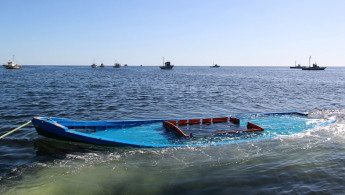Tunisia migrant interceptions surge fivefold
Tunisia's coastguard on Friday said it had intercepted over 14,000 migrants trying to reach Europe from January to March, more than five times the number of those who attempted the trip in the first quarter of 2022.
"Coast guard patrols prevent 501 clandestine attempts to cross the maritime border and rescued 14,406 [migrants] including 13,138 from sub-Saharan African countries," between 1 January and 31 March, it said in a statement.
That is up from 2,532 intercepted in the same period last year, including 1,657 from sub-Saharan Africa, National Guard spokesman Houcem Eddine Jebabli told AFP.
"The number is well up, because many more people are trying to leave," he said.
The vast majority of interceptions took place off the coast of Sfax and Mahdia provinces, whose shores lie just 150 kilometres (90 miles) from the Italian island of Lampedusa.
Tunisia has long served as a launchpad for people fleeing conflict in countries as far afield as Cameroon and Sudan to seek safety in Europe, often on overcrowded and unseaworthy boats.
Dozens of migrants from further south in Africa drowned in a string of incidents in March, after incendiary comments by Tunisian President Kais Saied sparked a wave of evictions and violence against black migrants.
The surge also comes as Italy's hard right-wing government pressures Tunis to reduce the number of people coming.
According to the Italian interior ministry, more than 14,000 migrants have landed in Italy since the start of the year, compared to just over 5,300 during the same period last year.
Migration experts have argued that despite European leaders' rhetoric against people traffickers, intercepting migrants while providing no safe passage for those genuinely needing it simply creates "repeat business" for traffickers.





 Follow the Middle East's top stories in English at The New Arab on Google News
Follow the Middle East's top stories in English at The New Arab on Google News


